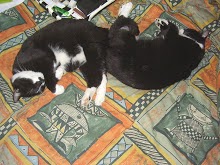Het
is om werkelijk schijtziek van te worden, welgestelden die van
gekkigheid niet meer weten wat ze moeten doen om boven het alledaagse
plebs uit te steken en daar is alweer wat nieuws op gevonden: chimpansee vlees
eten.......
Vooral in de VS en grote Europese steden schijnt apenvlees 'hip' te zijn.... De Britse douane onderschepte een paar weken terug zo'n 900 kilo bushmeat dat bestemd was voor de VS.....
Vooral in de VS en grote Europese steden schijnt apenvlees 'hip' te zijn.... De Britse douane onderschepte een paar weken terug zo'n 900 kilo bushmeat dat bestemd was voor de VS.....
Hierbij
wil ik de ook de hoop uitspreken dat dit westerse geteisem t.z.t. wordt afgeknald
en zelf wordt opgegeten. Gaat misschien wat ver, maar ze ebola wensen (veelal opgelopen door het eten van 'bushmeat', waartoe uiteraard ook
chimpansee vlees behoort) is niet zo slim daar deze ziekte zo
uitermate besmettelijk en dodelijk is.
Het
volgende artikel van het Care2 team werd geschreven door Susan
Bird:
Chimpanzee Meat Being Served as a Delicacy in the UK and US

If
you’re attending a ritzy event in the U.K., pay attention to the
meat being served. Some high-end private events in Britain are
offering chimpanzee meat
as a “delicacy.” That’s bizarre, illegal and dangerous, primate
experts say.
This
isn’t just a U.K. problem, by the way. Customs officials revealed a
few weeks ago they found and confiscated 2,000 pounds of “bush
meat” on a flight bound for the U.S.
“It’s
rife. It’s there — it’s in all the major cities across Europe
and the U.S.,” primate scientist Ben Garrod told The
Telegraph.
“We have seen bush meat confiscated in the U.K. in check points at
borders and in markets.”
Bush
meat is
meat taken illegally by poachers of wildlife, including chimpanzees,
gorillas, elephants, antelopes, pangolins and many others. Somehow it
has become a prized
delicacy in
Western countries, selling in Britain for five times the price of
beef or pork, according to The Telegraph.
Bush
meat poses more serious problems than people may realize. In addition
to the fact that bush meat comes from illegally killed endangered
animals, it’s also a tremendous threat to human health.
The
greatest danger is a doozy: Bush meat can carry the Ebola virus.
In
most cases, people get Ebola through contact with an infected animal,
such as a fruit bat or nonhuman primate. When an animal infects a
human, it’s known as a “spillover event.” Once a human begins
showing symptoms, the virus will spread from human to human via
direct contact with bodily fluids.
While
Ebola is not normally transmitted by food, the Centers
for Disease Control and Prevention advises
that “in certain parts of the world, Ebola virus may spread through
the handling and consumption of bushmeat (wild animals hunted for
food).”
Therein
lies the problem. If you eat or handle Ebola-infected bush meat,
you’ve begun a potential chain of events that could ultimately
infect and kill many innocent people.
“The
biggest worry for health authorities at the moment is that a disease
that can be passed between humans and animals will be the next big
pandemic,” Garrod told The Telegraph. “For example, HIV
originally came from primates. We are so similar, so the potential is
there for various pathogens and viruses to be transmitted or mutate.”
Renowned
primate expert Dr.
Jane Goodall agrees
with Garrod that bush meat poses a real threat. “Interpol is
becoming increasingly involved in animal trafficking and could,
perhaps, be persuaded to take a more active role in the bush meat
smuggling,” she told The Telegraph.
It’s
reportedly quite easy to get bush meat past customs officials because
it’s often smoked and blackened first. Bush meat looks like any
similar meat that’s been cooked in that way. How are customs
officials to know the difference? One way, Garrod suggests, is to
begin DNA testing imported meats.
“With
advances in DNA analysis and the price of them coming down it’s not
unreasonable that we could be checking for these things,” he told
The Telegraph.
To
avoid the potential for a pandemic, DNA testing seems to be a
reasonable recommendation.
An
even more effective way to eliminate the problem is to eliminate the
demand. Educate those who desire bush meat that they’re putting
their lives at risk — along with the lives of many others — for
the sake of a “delicacy.”
Respect
the chimpanzee. Don’t eat it. The same goes for any endangered or
vulnerable-status animal. Those who are importing bush meat to the
U.S. or U.K. are not people who must eat that kind of meat to
survive. They’re self-centered and uninformed — and they’re
creating unnecessary risk for the rest of us.
Photo
credit: Kylie Nicholson/Getty Images

